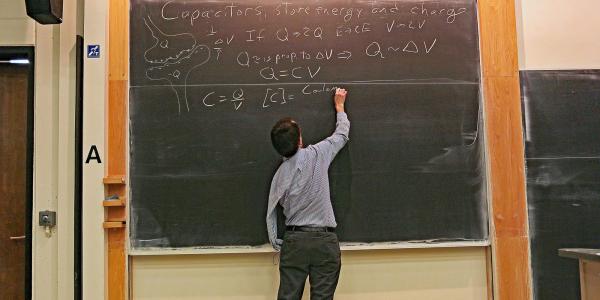The University of Colorado at Boulder today announced the formation of an exploratory committee to consider the structure and organization of a new interdisciplinary academic program of information, communication and technology.
"We want to strategically realign resources and strengths currently existing on the CU-Boulder campus to ensure that course and degree offerings meet the needs of students, the labor market, our campus mission and the communications needs of a rapidly changing global society," said Chancellor Philip P. DiStefano. "News and communications transmission as well as the role of the press and journalism in a democratic society are changing at a tremendous pace. We must change with it."
The creation of an exploratory committee will help to maximize the opportunity to form a new academic unit that will draw on existing strengths to prepare students for an ever-changing communications and media marketplace. The committee will forward recommendations to the provost by the end of the fall semester.
At the same time, the Academic Review and Planning Advisory Committee, or ARPAC, will initiate the process of program discontinuance of the School of Journalism and Mass Communication for strategic and budgetary realignment.
"In order to create a new program, we need to go through the formal process of evaluating how the School of Journalism and Mass Communication will change," said Interim Provost Russell Moore. "Changes to any academic program with tenured faculty must follow the Regent Policy on Program Discontinuance."
Earlier today, DiStefano met with journalism Dean Paul Voakes and Interim Provost Russell Moore met with faculty from the School of Journalism and Mass Communication to explain the vision for a new program of information, communication and technology.
The vision has been discussed on the CU-Boulder campus for several years and has been adopted in varying forms at peer universities.
"Many of our peer universities have already responded to the challenges of the networked Information Age in different ways," Moore said. "More than 30 schools and colleges have been created across the nation to respond to the changing media and communications digital landscape including UC-Berkeley, Washington, Rutgers, Cornell, Carnegie Mellon, Michigan and Wisconsin."
In 2009, the College of Information Task Force was charged with examining a new educational model and presented their report to Interim Provost Stein Sture on April 15 of this year. The task force report made several recommendations but did not address the future of the School of Journalism and Mass Communication.
After the program discontinuance process is initiated on Sept. 1, a report from ARPAC's program discontinuance committee will be due to the provost within 60 days. The provost will review the report and make his recommendations to the chancellor 30 days later. Both the exploratory committee's recommendation and the ARPAC report will be considered by the chancellor for a decision and recommendation to the Board of Regents sometime in early 2011.
In September, ARPAC will host open forums for faculty and students who have questions about the program discontinuance process. Open forums for faculty will be Tuesday, Sept. 7, and Wednesday, Sept. 8, from noon to 1:30 p.m. in University Memorial Center room 235. Open forums for School of Journalism and Mass Communication students will be held Tuesday, Sept. 14, from 3 to 5 p.m. and Wednesday, Sept. 15, from noon to 2 p.m. in UMC room 235.
Regardless of the outcome of the two committees, all undergraduate and graduate students who have been admitted to the school will be able to complete their degrees.
"The schools and colleges attracting excellent students, and preparing them for the new media and networked Information Age environment, are schools that while acknowledging the critical role the press and journalism have played in our democracy, approach information, communication and technology broadly and comprehensively," DiStefano said. "This visionary work is consistent with who we are as Colorado's flagship university. This action lives up to the promise of our Flagship 2030 Strategic Plan to give students the tools for success in their careers."
-CU-



